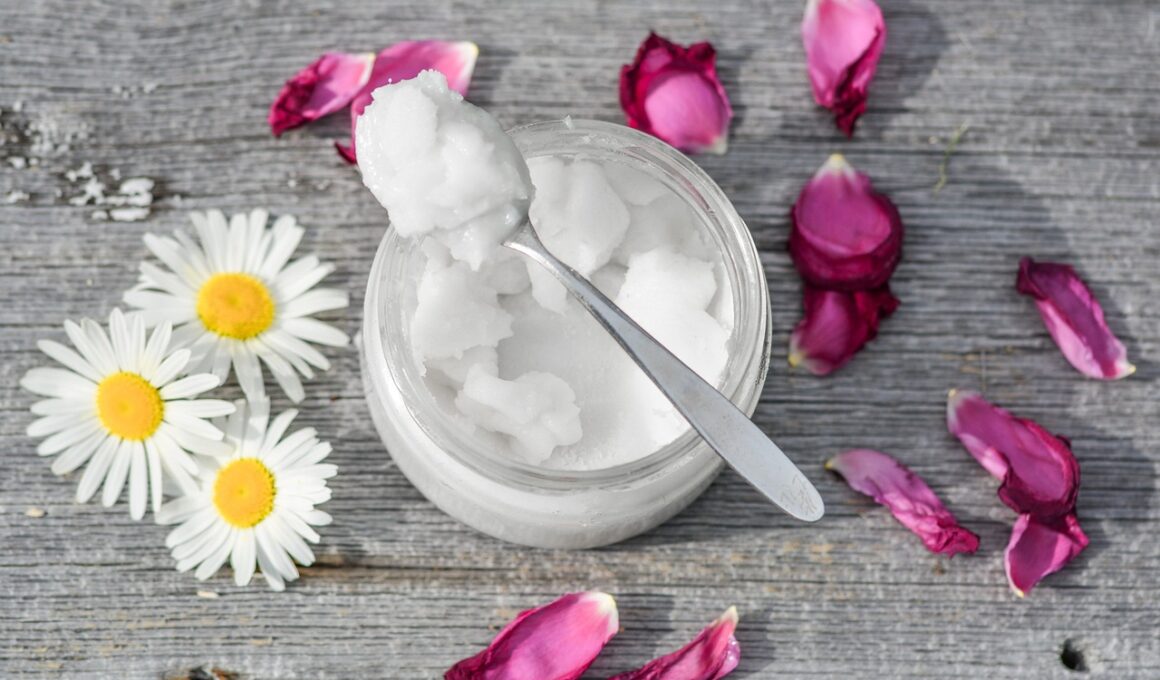Using Coconut Oil for Dog Grooming: Benefits and Tips
Coconut oil has gained popularity among pet owners, not only for its health benefits for humans but also for its effectiveness in dog grooming. This natural product can enhance your dog’s coat, promote skin health, and improve the overall grooming experience. Coconut oil is rich in saturated fats, particularly lauric acid, which offers numerous benefits. Its moisturizing properties help to keep both skin and coat hydrated, reducing the chances of dryness and irritation. Furthermore, using coconut oil can provide a natural shine to your dog’s fur, making it look vibrant and healthy. Many dog owners appreciate its versatility and ease of use. Besides grooming, coconut oil can also be utilized in homemade dog treats, providing nutritional benefits while maintaining their coat. Additionally, this oil has antimicrobial properties that can assist in preventing skin infections and promoting faster healing of minor wounds. Always introduce coconut oil gradually to your dog’s diet or grooming routine, monitoring for any adverse effects. For dogs with allergies or skin sensitivities, consult a veterinarian prior to using coconut oil as part of their grooming regimen. Naturally derived, this option appeals to pet owners seeking safe grooming alternatives.
Benefits of Coconut Oil for Dog Grooming
The benefits of coconut oil in dog grooming extend beyond mere aesthetics. Firstly, the moisturizing properties of coconut oil help to alleviate dry, itchy skin in dogs, making it especially beneficial during colder months when natural oil production decreases. Furthermore, coconut oil aids in reducing the occurrence of flaking and irritations caused by environmental factors. Regular application of coconut oil can lead to improved coat texture, making it softer and shinier. Pet owners often notice a reduction in shedding, as the moisturizer promotes healthy hair follicles. Additionally, coconut oil can serve as an effective remedy for minor skin conditions, such as hot spots, due to its anti-inflammatory properties. When applied externally, it can soothe irritated skin areas and reduce discomfort. Moreover, some dog owners have reported enhanced overall coat health when including coconut oil in their grooming routine. The antimicrobial properties of coconut oil also help to ward off fleas and ticks, making it an excellent all-natural alternative to chemical-based options. Overall, using coconut oil provides a holistic approach to dog grooming that promotes wellness and vitality, while ensuring a fluffy, soft coat.
Integrating coconut oil into your dog’s grooming routine can be an enjoyable process. Begin by applying a small amount of coconut oil to your hands and rubbing them together, which helps to warm and emulsify the oil. Once the oil reaches a workable consistency, gently massage it into your dog’s coat, ensuring you cover the skin thoroughly. Pay special attention to areas prone to dryness, such as elbows, paws, and the base of the tail. This application not only nourishes but also acts as a bonding experience between you and your pet. If your dog has a thick coat or is particularly furry, consider using a brush or comb to help distribute the oil evenly. This can enhance coverage and ensure every hair follicle receives moisture. Another effective technique is to incorporate coconut oil into their bath routine. Add a small amount of melted coconut oil to your dog’s shampoo for added hydration during their wash. This dual approach can ensure deep cleaning while also providing benefits from the oil. With consistent use, pet owners will notice improved coat quality, hydration, and general wellness in their furry friends.
Potential Drawbacks and Precautions
While coconut oil offers various advantages, it’s imperative to be aware of possible drawbacks. One primary concern is the caloric density of coconut oil, which could contribute to weight gain if used excessively in your dog’s diet. It’s essential to measure and monitor the amount given as a supplement. Excessive intake may also lead to gastrointestinal upset or diarrhea in some dogs. Always begin with a small quantity and observe your dog’s reaction, gradually increasing if no adverse effects occur. Another consideration is that some dogs may have sensitivities or allergies to coconut products. Consulting a veterinarian before incorporating coconut oil is a wise step to ensure your pet’s safety and health. When applied topically, if your dog exhibits increased itching or redness, discontinue use immediately. Furthermore, avoid applying coconut oil to open wounds or severely inflamed skin as it may exacerbate the condition. By being cautious and informed, you can enjoy the benefits of coconut oil while minimizing risks associated with its use. A balance is crucial, ensuring your furry friend benefits while keeping safety in mind.
Incorporating homemade grooming remedies can enhance the overall grooming routine and build a stronger bond with your dog. Apart from coconut oil, consider exploring other beneficial natural ingredients. For instance, oatmeal is an excellent addition for its soothing properties on irritated skin, while aloe vera can provide hydration and healing benefits. Creating a blend of these ingredients can result in a nourishing grooming experience. DIY shampoos and conditioners can be tailored to your dog’s specific skin type or grooming needs. Experimenting with different combinations can yield delightful results, ensuring a happy and healthy coat. Regular grooming sessions not only provide an opportunity for cleanliness but can also be therapeutic for your dog and deepen the bond between pet and owner. Always recognize your dog’s temperament during grooming; some may require patience when introduced to new products or routines. Through trial and understanding, you can find the right approach. Encouragement and positive reinforcement can further enhance their experience, making grooming an anticipated and enjoyable activity. Engaging with your dog in this way builds trust and synergy, ultimately leading towards a harmonious grooming routine that keeps your gentle friend looking his best.
Tips for Using Coconut Oil Effectively
To maximize the effectiveness of coconut oil in grooming, adhere to some fundamental guidelines. Firstly, opt for high-quality, organic coconut oil, as it often contains fewer additives and provides more nutrients. Virgin coconut oil is typically the best choice due to its unrefined process, preserving essential nutrients. Store the coconut oil in a cool, dry place to maintain its freshness and prevent rancidity, ensuring that it remains beneficial for your dog. When applying coconut oil, use warm or melted oil, as it penetrates the skin better and makes for an easier application. Ensure to coat the entire surface of your dog’s coat, distributing it evenly. For dogs with longer fur, consider using a comb to help achieve even coverage, reducing tangles and knots effectively. Depending on your dog’s grooming needs, adjust the frequency of application. Weekly or bi-weekly applications can help maintain skin and coat health without risk of overuse. Additionally, remember that while coconut oil provides significant benefits, it should complement a well-balanced diet and regular veterinary check-ups for optimal pet health. Keeping a holistic approach ensures a balanced lifestyle for your pet.
In conclusion, coconut oil is a versatile and effective ingredient for homemade dog grooming remedies. Its numerous benefits serve both topical and dietary purposes, contributing to your dog’s overall wellbeing. When utilized thoughtfully and safely, coconut oil can enhance the grooming experience, leading to healthier, shinier coats. Additionally, its natural properties can replace harsh chemicals and synthetic products that may irritate your pet’s skin. While it’s essential to be aware of potential drawbacks and be cautious with usage, overall, the positives far outweigh the negatives. Engaging in a regular grooming routine featuring coconut oil can have lasting effects on your dog’s comfort and happiness. Clouding this with positive reinforcement during grooming can turn it into a fun bonding experience. Always prioritize your dog’s health by consulting a veterinarian when trying new products or methods. By integrating coconut oil into your pet care routine, you are taking a proactive step towards ensuring your furry companion remains healthy, happy, and well-groomed. The small efforts you invest in grooming contribute enormously to your dog’s self-esteem, leading to a happier and more confident pet.
Coconut oil has gained popularity among pet owners, not only for its health benefits for humans but also for its effectiveness in dog grooming. This natural product can enhance your dog’s coat, promote skin health, and improve the overall grooming experience. Coconut oil is rich in saturated fats, particularly lauric acid, which offers numerous benefits. Its moisturizing properties help to keep both skin and coat hydrated, reducing the chances of dryness and irritation. Furthermore, using coconut oil can provide a natural shine to your dog’s fur, making it look vibrant and healthy. Many dog owners appreciate its versatility and ease of use. Besides grooming, coconut oil can also be utilized in homemade dog treats, providing nutritional benefits while maintaining their coat. Additionally, this oil has antimicrobial properties that can assist in preventing skin infections and promoting faster healing of minor wounds. Always introduce coconut oil gradually to your dog’s diet or grooming routine, monitoring for any adverse effects. For dogs with allergies or skin sensitivities, consult a veterinarian prior to using coconut oil as part of their grooming regimen. Naturally derived, this option appeals to pet owners seeking safe grooming alternatives.


